- Home
- Mary Stewart
The Stormy Petrel Page 6
The Stormy Petrel Read online
Page 6
I trod up through the seaweed at the edge of the beach, then followed the path to the gate in the garden wall. I peered through the bars. Inside the grounds the path continued, curving up between the overgrown rhododendrons in the direction of the house. I hesitated. There would presumably be a driveway of sorts leading from the back of the house to the road and my easiest way home. To try and get to it by going round outside the garden wall meant ploughing through waist-high nettles and clumps of bramble. So . . . ? So I opened the gate and went through.
There had never been much of a garden, only the rhododendrons flowering red and pink and lilac, where bees droned happily. Beyond the wild tangle of flowers I could just see the upper storey of the house, grey stone with tall sashed windows and a roof of grey slate with its unsmoking chimney stacks. There were curtains in the windows. The place must still be furnished, then. I tried to remember when Mrs McDougall had said the old lady had died. February? And Archie McLaren had told me that the house would probably have to be sold, so it was to be supposed that at any time now people might be coming to look at it.
It was the subconscious mind taking over again. I found myself halfway up the path between the rhododendrons before the conscious mind caught up with the fact that, though there had been a padlock on the garden gate, the gate had been unlocked. So, surely there could be no objection to someone taking a look at a place that would soon be up for sale anyway? I crossed a lawn that badly needed cutting, and started on a cautious tour of the Hamilton house.
I doubt if there are many normal women who can resist looking at houses. I believe, in fact, that when a house is up for sale more than half the people who look over it are not prospective buyers, but merely ladies who cannot resist exploring someone else’s house. I had never done that, but I was not immune. I trod carefully up to the most important-looking window, and peered in.
The drawing-room. A rather lovely fireplace, with a hideous overmantel. Faded carpet and curtains. Typical family paintings of dim-looking, not-quite-Raeburns, and improbable horses and dogs. Round tables with skirts, their surfaces smothered with photographs. Sagging armchairs with faded covers, not too clean. A quite awful vase in one corner, full of dried pampas grass.
The dining-room. More portraits, if possible duller still, and lightened by a couple of horrendous still lifes, dead hares and poultry, staring eyes and blood congealing from beaks and nostrils; just the thing to give one an appetite for meals.
The gunroom . . . But enough of that. It was a very ordinary, rather pleasant, Highland country house; originally a shooting-lodge and of no great size or importance for the day when it was built. And meant only for summer and early autumn; no heating apparatus except the open fires, and a kitchen rather on a par for mod cons with my cottage at Otters’ Bay.
The only thing that was quite extraordinary was what I found when I got as far as the back premises.
The back door was standing open.
My excuse, a thin one, is still the subconscious mind. I did knock at the door, then, when there was no response, took a couple of steps through into a passage floored with stone slabs and containing nothing but some buckets of coal and a rack of ancient clothes, gardening clobber by the look of it. In spite of the open door, the place smelled of damp and disuse.
The kitchen door was on my right. I pushed it open. Emptiness again; somehow a kitchen, which is the warm heart of any house, is the worst place of all when it is disused. The house is dead without the warmth and the smells of cooking and the pulse of daily living. In the stuffy silence the sound of the cold tap slowly dripping was almost cosy; a substitute heart beat. Even so, my presence felt like an intrusion. But as I turned to go something caught at my attention. A key-rack just beside the doorway, with keys hanging there, labelled. One hook was empty; the hook labelled ‘C. na Dobhrain.’ Otters’ Bay.
For no good reason, that settled it, by which I mean that what conscience I had was put to sleep by sheer, raging curiosity. Could my night-time visitor have called in here to pick up the key he had shown me, and left the back door open at the same time? Had he put into this bay first, then come up past the house and, finding it open, taken the key? But why should he trouble? If he had really only been looking for shelter and a place to doss down for the night, why look further than this? Why make the wet and stormy trek to Otters’ Bay? Even if he had thought that his parents were still there – which I found hard to believe – he could have visited them in the morning.
Somehow, this seemed to justify what I had done. If there was indeed any mystery about Ewen Mackay’s visit to my cottage, the clue to it might well be here, in the house he had claimed to be familiar with. More, he had hinted, unless I had misread him, at a connection with the family. Perhaps he even considered himself to have some kind of claim to the place? At least, then, the note that had been left for me (‘See you around?’) gave me some excuse for trespassing now.
I went on down the passage, towards the green baize door that closed the back premises off from the gentry’s quarters, pushed the door open, and trod tentatively into the front hall.
This was darkish, lighted only by the stained glass fanwindow over the shut front door. To one side stood a heavy oak table piled with the usual clutter – magazines, newspapers, a couple of heavy electric torches, some anonymous boxes. Opposite this another, smaller table held gloves, a sou’wester, and a gardening-basket crammed with implements. There was a brass stand holding walking-sticks, and a dark oak settle where someone had thrown down a Barbour coat and an old anorak. Some pairs of boots and wellingtons were lined up beside it, and on the wall, above a crude, oil landscape that seemed meant to depict the moor where the diver nested, was a long rack, presumably meant for fishing rods.
The impression of a house where the occupants had just walked out for a stroll in the garden was very strong. My presence there seemed, suddenly, an intrusion; my curiosity, if not an outrage, at any rate no excuse for going any further.
I turned to go out the way I had come. But even as I turned, I heard something. A sound from upstairs. The creak of a door.
My heart gave a jump, then resumed something like its normal beat as I registered the fact that even in an empty house there were draughts, and doors moved and creaked with no one to push them. But I did make for the baize door a little more quickly than on my way in, and in the semi-darkness stumbled over one of the wellingtons, kicking it halfway across the floor. I only saved myself from falling by clutching at the arm of the oak settle.
Something came down the stairs like an avalanche. A pair of powerful arms seized me from behind, jerking me upright and off my feet. Clutched tightly to the breast of a Shetland sweater I took breath and screamed.
The arms, suddenly nerveless, dropped me, and the Shetland sweater retreated smartly. I fell onto the settle, hit my elbow on the carved armrest, and drew in my breath to scream again.
‘Don’t!’ said John Parsons hastily. ‘Please don’t! I’m terribly sorry. I thought it was – I didn’t realise it was a girl. I wouldn’t dream of – Oh, it’s you.’
I abandoned the scream. I rubbed my elbow, regarding him thoughtfully. He towered over me, looking anxious, rather flustered, and not in the least dangerous. I said: ‘Well, who says it first?’
‘Says what?’
‘“What are you doing here?” So what are you doing here? I know you found your tent, but perhaps you thought this might be a more comfortable bivouac than my cottage? Is that it?’
‘Not quite. I – actually, the tent was never lost, but—’
‘Where’s Ewen Mackay? Is he sleeping here too?’
‘No. Why should he be? Then he isn’t with you?’
‘No, he is not.’ Because I felt both guilty and embarrassed, I reacted sharply. ‘For goodness’ sake, surely you didn’t fall for all that nonsense of his the other night? I’d never seen him before in my life! I think he must have taken the key for my cottage from the board by the kitchen door. It seems to be tru
e that the cottage used to be his home, but you don’t carry a big old-fashioned key like that around in your pocket for years, so I don’t see how else he got it. If he broke in – but then why come to the cottage at all? And why should you? Did you break in here, too, or has the back door been unlocked the whole time?’
He answered only one question out of this barrage, and it was enough. ‘Neither,’ he said. ‘I had a key.’
‘You had a key?’ The repetition sounded stupid. But the situation was itself a repetition of Wednesday night’s adventure. ‘You, too?’ I took a breath. ‘But perhaps – did you have an order to view, or something?’
‘Not quite. The house is mine.’
‘Oh, no! Not again!’ I must have sounded, if possible, more stupid than ever. ‘Yours?’
He smiled suddenly. ‘Yes, mine. I’m not sure how long wills take to prove, but I was Aunt Emily’s only living relative, and it’s always been understood that the place would come to me. In any case, someone had to come and try to sort things out. I’m Neil Hamilton.’
I managed to stop myself from repeating that, too. ‘I see. Well, thank you for telling me, Mr Parsons.’
He said, apologetically: ‘I’m sorry about that, but there were reasons. Why don’t we go somewhere more comfortable and discuss them? I do owe you that. In here?’
He opened the drawing-room door and ushered me through.
9
He crossed to the french window and pushed it open. Seen in this light, and in the light of what he had now told me, I studied him afresh.
He was tall, and looked sunburned, as if he had spent time recently in a climate far from the Hebrides. Not handsome, but nice-looking in a way I had usually rather deprecated, if not despised: not the lean and craggy looks that I had always admired, but a blunt-featured face with a wide mouth, dark eyes tilted slightly down at the outer corners, and an untidy thatch of brown hair of which a couple of locks fell over a broad forehead, and were from time to time irritably brushed back. I saw that he was, in his turn, studying me. He would be seeing, I thought, an unremarkable young woman, rather too solemn, with thought-lines developing too fast between level dark brows; dark-brown hair and grey eyes; tolerable nose and mouth, and – my only real claims to beauty – a good figure and a fine, fair skin.
‘So I take it that you’re just here for a holiday, on your own, Miss Fenemore? Or do you prefer Ms?’
‘Sorry?’
‘Do you prefer Ms? If that is how one says it?’
‘It sounds just like a goose hissing. Unpronounceable – and unnecessary, unless you don’t want people to know you’re not married. Which I’m not, but I still hate it.’
‘You sound a bit fierce. I wasn’t sure. Some ladies insist.’
‘Not this one. Actually, if you could say it was short for “Mistress”, which is rather nice, and very correct in Scotland . . . I’d certainly settle for that. Or, well, “Rose” would be the easiest, wouldn’t it? Sorry, don’t tell me, I know. I’m being priggish. But I like words, and that’s a non-word if ever there was one.’
‘Well, it’s a good hobby horse.’
‘Hobby horse nothing. It’s my job. I teach English at Cambridge. Haworth College. And yes, this is just a holiday. My brother was to have come with me; he’s a doctor working in Petersfield, and he’s a dedicated bird-watcher and photographer. He was to have joined me this week, but his train met with an accident, so he’s been detained for a few days with an injured ankle. He’s coming over as soon as he can. Monday, I hope. That’s all about me. Your turn, Mr Hamilton-Parsons.’
‘Oh, well. The Parsons bit was a not very inspired lie. You saw it, didn’t you, when you got up to go upstairs? The postcard on the mantelpiece?’
‘Yes. But the point is, why?’
‘I couldn’t give my own name, till I found out what that fellow was up to. I should have thought up something better on the way over, but no one could think in that wind. It was all I could do to keep my feet.’
‘So you knew he was “up to” something? You mean you knew from the start that he had no connection with me?’
‘No, no. I did take you for a couple staying there together, and normally I would have retreated smartly and come back here again, but for what had already happened. Look, why don’t you sit down and make yourself comfortable? I’d better start at the beginning, and it’s a long story.’
I did as he suggested. He stayed on his feet by the window.
‘I’m Neil Hamilton, as I told you, and Mrs Hamilton was my great-aunt. I’m a geologist – that bit was true – and until recently I’ve been working in Sydney. Then I heard about Aunt Emily’s death. The end came rather suddenly, so I couldn’t have got back in time to see her, but I flew over as soon as I was free, to see what had to be done. There’s no one else. I was very fond of her when I was a child, and used to spend most of my holidays up here with her – my father was in the Consular Service, so my parents spent a lot of their time abroad. But latterly I’ve been here very little; in fact it must be at least fifteen years since I stayed here for any length of time . . . Yes, I had my fourteenth birthday here. Uncle Fergus gave me a gun, I remember. He still had hopes of me, but I’m afraid I never enjoyed killing things. Still don’t.’ He smiled. ‘He’d have been ashamed of me. Not the ideal Scottish laird at all.’
As he spoke, he had been wandering round the room, picking up photographs, looking at books, standing in front of the pictures; a sort of half-abstracted and apparently unemotional tour down Memory Lane. I brought him back to the matter in hand.
‘And what brought you to my cottage in the middle of the night, with that story about your tent blowing away? In fact, why a tent at all? All those lies for Ewen Mackay before you’d even met him?’
He turned back to me. ‘Yes, we come to that. They were lies, but as it happens I had met him before. Many years ago, when we were boys. If you remember, he half-recognised me. I had already recognised him, but fifteen years or so, boy to man, is a big change, and I doubt if he got it. In fact I’m sure he didn’t. We talked late that night, and he would surely have said something.’
‘I see. Or rather, I don’t, yet. Are you telling me that because you recognised him you had to put on that charade? That you had some reason to distrust him?’
He nodded. ‘As a boy he was – well, shall we just say undependable? But it wasn’t that. I had my lies ready before I ever recognised him. I’d seen him earlier that night, here at the house, behaving in a way that made me very anxious to find out what he was doing here on Moila.’
‘Here? You were here then? Everyone said the place was empty.’
‘It was. I’d just arrived, and I hadn’t been up to the village yet, or seen anyone. Still haven’t, if it comes to that.’
‘How did you get here?’
‘I have a boat. Hired. Aunt Emily sold the one that was here; she had no use for it latterly. I came across from Oban – made a run for it, with the weather worsening all the time, but got here safely and made straight for our bay. Put the boat into the boathouse and made the doors fast, then came up to the house. I’d been to see my great-aunt’s solicitors in Glasgow and they gave me the keys. I’d bought all I needed in Oban, so I just came up here and got myself settled in. It was pretty late and I was tired, so I found my old room and went straight to bed. It was well after midnight, getting on for one o’clock, when I went to open the bedroom window, and saw someone coming up through the garden from the bay.’
He stopped prowling at last, and dropped into one of the easy chairs facing me.
‘Of course at first I just thought it was someone from a boat that had been driven in by the weather. You remember that night was pretty dark, so I couldn’t have seen if there was a boat tied up at the jetty. The chap had a torch. Coming to ask for shelter, I thought, though why he couldn’t sleep in his boat . . . As I said, it’s quiet down there in the channel, even in a storm. That made me wonder what he wanted, so I stood and watched. He got a
s far as the lawn, just out there, and then he stopped and stood, seemingly just staring at the house. That seemed odd, too, in all that rain. Anyway, I came downstairs. The front door was still locked and bolted – I’d only used the back one since I’d got here – and the keys were out the back, so I came in here to open these french windows. I didn’t put any lights on, and when I got into this room I was thankful I hadn’t. I found him trying the window.’
‘Well,’ I said reasonably, ‘in that storm, and if he thought the house was empty –’
‘I know. I thought so, too. But he didn’t just try the handle. He had some kind of tool, and he was trying to lever the window open. I stood there like a fool, watching him. Somehow one isn’t prepared for that kind of situation . . . Then I thought, well, I’ll have to tackle him somehow, so the best way, rain or no rain, was to go out the back way and take him from behind.’
‘He had a gun,’ I said.
That startled him. ‘Had he indeed?’
‘I think so. But go on, please!’
‘I’m not exactly a man of action – that kind of action. Who is, except in television series? There used to be guns in the house, of course, but it never occurred to me to look if they were still there. But I must have felt the need for some support, because I found I’d grabbed hold of one of my hammers – a geologist is always armed with a hammer – and when I got through to the back of the house he was there already, at the kitchen window.’
‘Good heavens! So?’
‘I’m not quite sure what might have happened then, but for some reason he gave up. He could have forced the window in time, anyone could, but he seemed suddenly to think better of it. One moment he was there on the sill, and then suddenly he was gone. I ran upstairs to see what I could, and there he was, torch and all, running down the garden and then dodging his way up to the cliff path, and fast, as if he knew exactly where he was going. Of course I knew the path led to the Camus na Dobhrain, and the lawyers had told me that the cottage was let to a girl, so I wondered why he was headed there. I mean, there was nowhere else he could have been going. So I decided to follow along and see what was going on.’

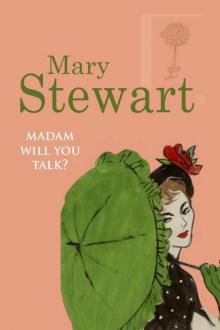 Madam, Will You Talk?
Madam, Will You Talk? Legacy: Arthurian Saga 1-4
Legacy: Arthurian Saga 1-4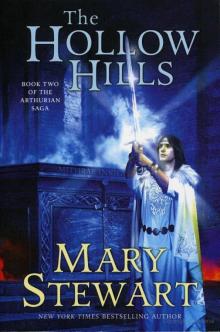 The Hollow Hills
The Hollow Hills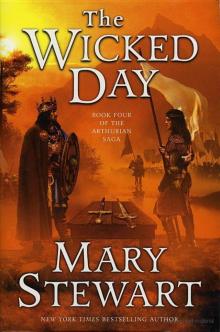 The Wicked Day
The Wicked Day The Last Enchantment
The Last Enchantment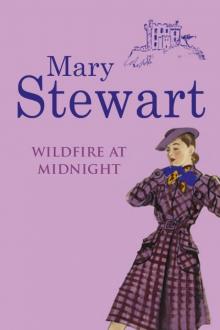 Wildfire at Midnight
Wildfire at Midnight The Crystal Cave
The Crystal Cave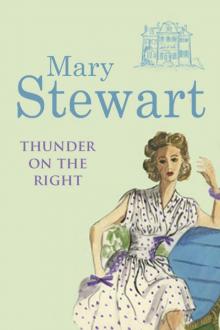 Thunder on the Right
Thunder on the Right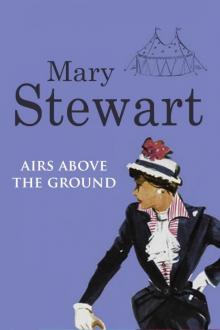 Airs Above the Ground
Airs Above the Ground The Ivy Tree
The Ivy Tree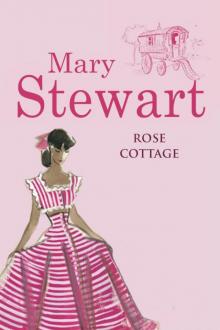 Rose Cottage
Rose Cottage The Gabriel Hounds
The Gabriel Hounds Legacy: Arthurian Saga
Legacy: Arthurian Saga The Wind Off the Small Isles
The Wind Off the Small Isles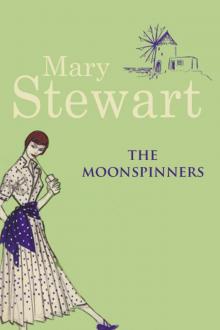 The Moonspinners
The Moonspinners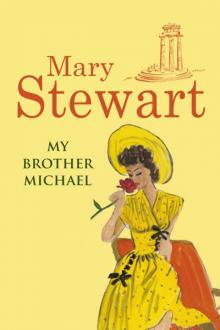 My Brother Michael
My Brother Michael The Prince and the Pilgrim
The Prince and the Pilgrim A Wlk in Wolf Wood
A Wlk in Wolf Wood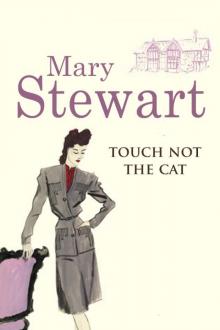 Touch Not the Cat
Touch Not the Cat The Little Broomstick
The Little Broomstick Thornyhold
Thornyhold This Rough Magic
This Rough Magic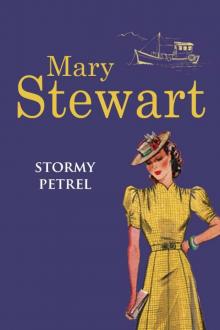 The Stormy Petrel
The Stormy Petrel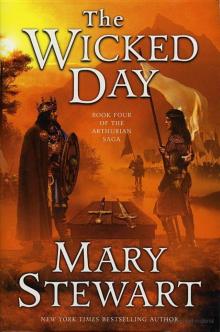 Wicked Day
Wicked Day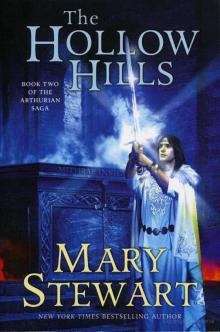 Hollow Hills
Hollow Hills WILDFIRE
WILDFIRE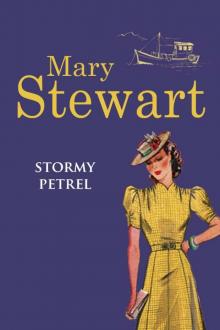 Stormy Petrel
Stormy Petrel Legacy
Legacy Crystal Cave
Crystal Cave Last Enchantment
Last Enchantment